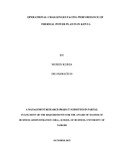| dc.description.abstract | The advent of thermal generation of electricity dates back in back in 1996 when aid embargo
was imposed in the country a time when draught had almost crippled the economy due to
dwindling of hydro power plants to les than 20%. That was the critical time in the history of
Kenya owing to the fact electricity cuts across all the three pillars as contained in the vision
2030 blue print. To date, seventeen years of thermal energy generation has not been an easy
journey. This is characterized by the frequent regional and national blackouts. Generation
business is guided by the power purchase agreement a binding document that contains the
key pillars that measures performance. This study sought to establish the operational
challenges that affect performance of thermal power plants in Kenya. It was guided by a
single objective which was to examine the operational challenges in thermal power plant. The
study employed a descriptive research design. The population consisted of six thermal power
plants in Kenya as listed in appendix IV as provided by the MoE. The study targeted two
relevant departments which are operations and maintenance of which six respondents was
sought on each as follows, one departmental manager, two engineers and three supervisors
totaling to six hence making twelve respondents in the two departments. A total of seventy
two respondents were targeted. The response rate was a phenomenal 100% male which was
71.94 % (59 respondents out of targeted 72). In the survey six crucial variables were
exhaustively analyzed namely (reliability, utilization factor, quality, cooling water, spares
acquisition and efficiency). Reliability and utilization factor were seen to be the biggest
challenges affecting the performance of thermal power plants. Quality, cooling water and
efficiency were seen to be strong practices that promote performance. It was recommended
that more studies be done to focus on how the national grid can be developed and also craft
and subsequent review the power purchase agreement since all are external factors that
directly affect performance of the generating companies. Some companies were seen to have
generation reserve and others did not. This area also requires further research on how
performance is affected in line with generation sector. Owing to the findings of the research it
was suggested that future studies be done to include hydro, geothermal wind and solar power
generation. Also fundamentally, a future study be done on effects of monopoly of purchase of
bulk power. Future studies should also consider expanding the topic to include moderating
variables like equipment useful life and environmental factors. | en |

